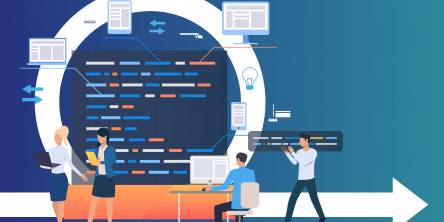Microsoft Power Apps: Why it is the Ideal to Build Business Apps in 2022
As technologies continue to evolve, businesses are starting to feel a growing need for solutions that can help them keep up with the changing circumstances in the market as well as the distinctive needs of their customers. Microsoft Power Apps is rapidly gaining popularity as the top tool for such a scenario, for it enables rapid app development sans the fuss associated with the traditional development process.
It is fundamentally a development platform for mobile and web apps that allows “citizen developers” to reach capabilities. It was once only reserved for high-end development tools. And, what’s more, PowerApps makes it quite easy to learn. It allows users to swiftly take charge of making the correct decisions when it comes to structuring.
. Listed below are some of the other benefits that Power Apps offers to companies.
1. Low-code development: Perhaps one of the most celebrated features of Power Apps is the fact that it necessitates low to no coding for the development of top-notch apps. This means that companies do not need to hire expensive development teams and still be able to quickly deploy robust apps.
2. Intelligence automation: A crucial feature Power Apps brings to the table is a set of automation tools that can assist companies in a variety of aspects such as data sharing, customer relations management, task monitoring, etc.
3. Quick development: Since Power Apps is underpinned by a simple system, making it easier for companies to develop their apps lightning-quick. See, with Power Apps, companies gain a collection of templates of features, functionalities, etc. which can be added to the intended app by just dragging and dropping the needed functionality into the development canvas.
4. High-levels of security: The Power Apps suite allows companies to use Common Data Services via the role-based security model. As a result, the app’s users can set up security roles based on relevant access permissions. This helps protect businesses against myriad security-related vulnerabilities. Additionally, companies can ensure that employees can access only the data relevant to their job roles.
5. Cost efficiency: The conventional methods for app development are notoriously expensive and time-consuming. This is not a problem with Power Apps which empowers companies to quickly build highly capable customized apps for their businesses albeit without humongous investments.
Let us wrap this up with a handful of examples of some Power Apps-based apps.
1. Employee onboarding apps: Onboarding new employees is a complex but a critically-important part of any organization. The process can be made much easier with the help of Power Apps-driven employee onboarding employees.
2. Hazard reporting apps: For companies that often have employees in the field, it is imperative to keep a close eye on any hazards the staff may encounter. Power Apps can be used to build hazard reporting apps for companies.
3. Shift management apps: Countless companies all over the world also use Power Apps-based apps to efficiently manage their employees’ shifts.
Though a relatively new arrival on the scene, the Microsoft Power Apps suite has proven to be an invaluable tool in the arsenal of countless modern companies across the broad spectrum of industries around the world. It not only empowers companies to easily build tailored apps for their business, but also significantly cuts down the timelines involved in the design, development, and deployment of such apps. Let us not forget it also makes app development quite affordable, thus rendering Power Apps especially practical for small-scale businesses. So, if you too are considering bringing this mighty powerful Microsoft offering into the fold, we recommend you start by looking for a trusted provider of Power Apps consulting services.
Similar Articles
Unless you have been hiding in a cave somewhere, you would know and realize that the world is creating information at a stunning speed. While it is genuinely considered normal information that said data can now be turned into the groundwork of achievement for essentially any business in the present day and age.
Software development refers to the procedure of constituting and nourishing software applications. This provokes the utilization of many fundamentals and practices. Software development targets constitute structured, dependable, and beneficial software.
Designing a data warehouse is a strategic activity that builds the groundwork for strong data management and analytics capabilities within a business. In today's data-driven world, the systematic creation of a data warehouse is not only a technical requirement but also a critical step in harnessing the power of information for informed decision-making.
The integration of Internet of Things (IoT) technology into the construction and real estate sectors, which include buildings, infrastructure, homes, and businesses, is predicted to increase dramatically in the future. Despite this predicted expansion, the construction industry is behind other industries in terms of IoT adoption.
In this dynamic world of innovative and transformative technology, the use of Minimum Viable Product (MVP) has proven to be a winning strategy for success.
While monolithic applications may have waned in popularity during the era dominated by the cloud and microservices, interest is resurgent. Organizations, in considering their position on the application modularity spectrum, are now examining both the advantages and drawbacks of relying on microservices.
Data visualization is an indispensable tool that allows us to transform raw, and often unstructured data into insightful visuals, identify patterns, and communicate these insights to the wider audience and stakeholders.
For modern businesses to thrive, ensuring the effective management of inventory stands has become vitally important. Inventory management stands as a cornerstone of success. And the emergence of the Internet of Things (IoT) has introduced a new era of connectivity and efficiency across diverse industries.
Do you know what the following e-commerce companies have in common: Amazon, Walmart, eBay, and more? All of these e-commerce companies' apps make use of Java. Java is decidedly among the leading choices of programming language for e-commerce applications because it offers a world of benefits; for example, since Java code can be run on any platform with a Java Virtual Machine (JVM), users of e-commerce apps made with Java can access the said apps on a variety of devices.








